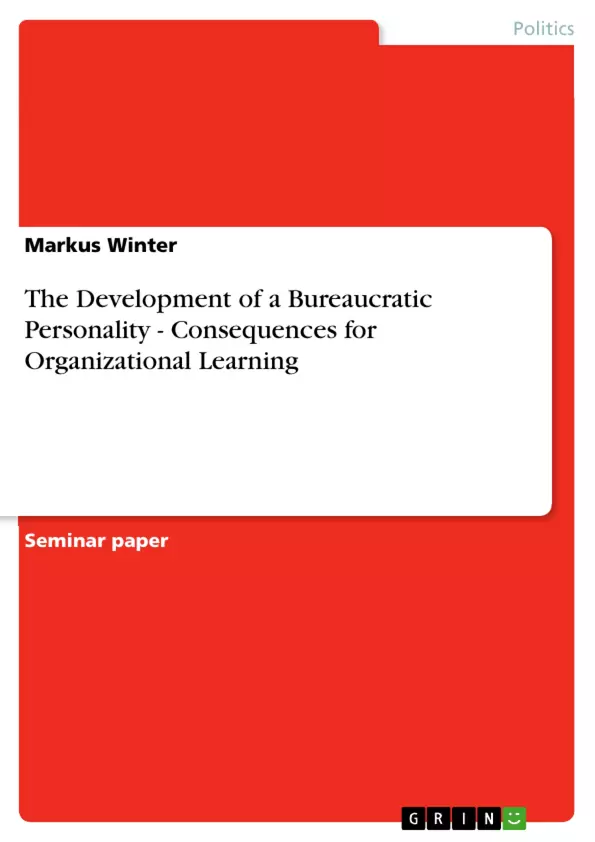Effective learning supplys organizations with the abilities to cope with problems. Learning is occuring when organizations interact with their environments: organizations develop their understanding of reality by observing the results of their acts (cf. Hedberg 1981: 1). Even and especially bureaucratic organizations need to learn, when taking into account a fast changing environment.
Everybody of us has made his or her own experiences with bureaucracy in their everyday life. This seminar paper with the title “The Development of a bureaucratic personality-consequences for organizational learning” will not focus on impacts on clients but on impacts on the members of organisation, especially on subordinates and the middle management.
The aim of the seminar paper is to find out what negative consequences has bureaucracy on the personality of an individual and on organizational learning. Using a functionalist approach to the topic, bureaucracy intends to create an efficient organisation from a rationalistic point of view. I will focus on the unintended outcomes of bureaucracy, the dysfunctions which show that there are irrational factors that are not easy to predict. I will describe in the theoretical part of this work the he ideal type of bureaucracy, to have a basis from which later on the negative outcomes are explained. The concept of personality will be described after this, which is used to compare in the second part the changes to a bureaucratic personality. The model of organizational learning from Hedberg (1981) will be the focus after that, to show how learning is occurring in organisations and which prerequisites are necessary for this. The next step is the explanation of the model of Bosetzky and Heinrich, which shows the consequences of inner acceptance of the bureaucratic socialization. Then I will show through the description of the work of Robert K. Merton the development of a bureaucratic personality, including trained incapacity occupational psychosis, and the consequences of that for organizational learning. Then I will finish with an conclusion.
Table of Contents
- Introduction
- Definitions and theoretical basis
- The ideal type of Bureaucracy
- The definition of Personality and possible development
- organizational learning Hedberg (1981)
- The Model of Bosetzky and Heinrich
- The Development of a bureaucratic personality
- Characteristics of a bureaucratic personality
- Trained incapacity
- Occupational psychosis
- Characteristics of a bureaucratic personality
- Discussion
- conclusion
- References
Objectives and Key Themes
This seminar paper investigates the negative consequences of bureaucracy on individuals' personalities and organizational learning. Utilizing a functionalist approach, the paper focuses on the unintended outcomes of bureaucracy, particularly its dysfunctions. The study aims to understand how bureaucracy, while intending to create an efficient organization from a rationalistic perspective, can inadvertently impact the individuals within it. The paper will analyze the ideal type of bureaucracy, explore the concept of personality, and examine the model of organizational learning, ultimately leading to an understanding of the development of a bureaucratic personality and its implications.
- The impact of bureaucracy on individual personalities
- The unintended consequences of bureaucratic structures
- The concept of organizational learning and its prerequisites
- The development of a bureaucratic personality
- The relationship between a bureaucratic personality and organizational learning
Chapter Summaries
The introduction outlines the importance of organizational learning and its relevance within bureaucratic structures. It highlights the paper's focus on the impact of bureaucracy on individuals within the organization, especially on subordinates and middle management. The chapter also states the aim of the paper, which is to explore the negative consequences of bureaucracy on individual personalities and organizational learning.
Chapter 2 delves into the definitions and theoretical basis of the study. It introduces the ideal type of bureaucracy based on Max Weber's work, outlining its characteristics such as division of labor, office hierarchy, written documentation, separation of organizational and personal lives, trained experts, full working capacity and career tracks, and general rules. It also discusses the characteristics of a bureaucrat as described by Weber.
Chapter 3 presents the model of Bosetzky and Heinrich, which examines the consequences of internalizing bureaucratic socialization. Chapter 4 focuses on the development of a bureaucratic personality, specifically discussing the characteristics of trained incapacity and occupational psychosis. It explores the potential consequences of these characteristics on organizational learning.
Keywords
The seminar paper centers around the concepts of bureaucracy, organizational learning, personality development, trained incapacity, occupational psychosis, and unintended consequences. It analyzes the effects of bureaucratic structures on individuals within organizations, exploring the potential for both efficiency and dysfunction.
Frequently Asked Questions
What is a "bureaucratic personality"?
A bureaucratic personality refers to individuals who have internalized the norms and structures of a bureaucracy to the point where their behavior becomes rigid, focusing more on rules than on the organization's goals.
What does Robert K. Merton mean by "trained incapacity"?
Trained incapacity is a state where a person's abilities function as blind spots. In a bureaucracy, strict adherence to rules makes individuals unable to adapt to new or changing situations.
How does bureaucracy hinder organizational learning?
Bureaucracy can hinder learning through its rigid hierarchy and over-reliance on fixed rules, which discourages the flexibility and environmental interaction necessary for an organization to adapt and grow.
What is "occupational psychosis" in the context of this paper?
Based on the work of Merton, occupational psychosis refers to a condition where daily routines and professional requirements warp an individual's perception, leading to irrational behavior in non-routine situations.
What are the characteristics of Max Weber's "ideal type" of bureaucracy?
Weber's ideal type includes division of labor, a clear hierarchy of offices, written documentation, specialized training, and management based on general, impersonal rules.
Why is Hedberg's (1981) model of organizational learning important?
Hedberg's model explains that organizations learn by interacting with their environment and observing the results of their actions; this paper uses it to show how bureaucratic structures can disrupt this vital process.
- Quote paper
- Markus Winter (Author), 2011, The Development of a Bureaucratic Personality - Consequences for Organizational Learning , Munich, GRIN Verlag, https://www.grin.com/document/176009



